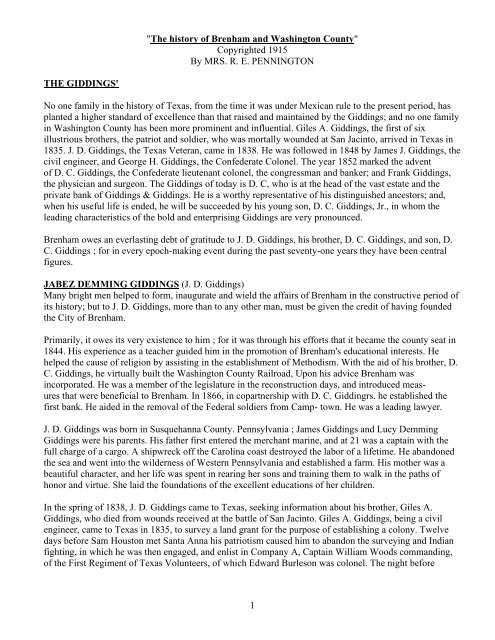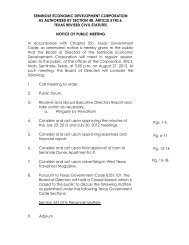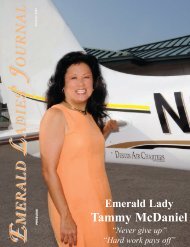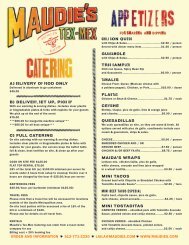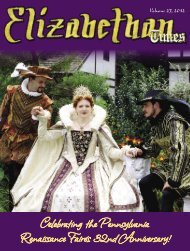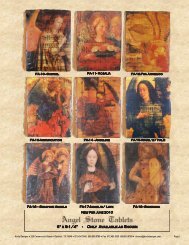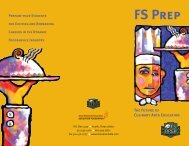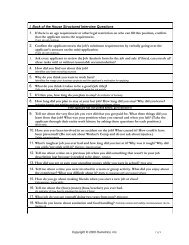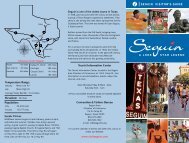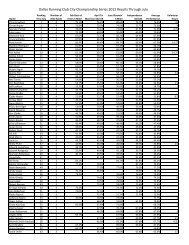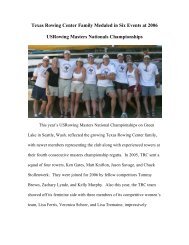"The history of Brenham and Washington County"
"The history of Brenham and Washington County"
"The history of Brenham and Washington County"
You also want an ePaper? Increase the reach of your titles
YUMPU automatically turns print PDFs into web optimized ePapers that Google loves.
"<strong>The</strong> <strong>history</strong> <strong>of</strong> <strong>Brenham</strong> <strong>and</strong> <strong>Washington</strong> County"Copyrighted 1915By MRS. R. E. PENNINGTONTHE GIDDINGS'No one family in the <strong>history</strong> <strong>of</strong> Texas, from the time it was under Mexican rule to the present period, hasplanted a higher st<strong>and</strong>ard <strong>of</strong> excellence than that raised <strong>and</strong> maintained by the Giddings; <strong>and</strong> no one familyin <strong>Washington</strong> County has been more prominent <strong>and</strong> influential. Giles A. Giddings, the first <strong>of</strong> sixillustrious brothers, the patriot <strong>and</strong> soldier, who was mortally wounded at San Jacinto, arrived in Texas in1835. J. D. Giddings, the Texas Veteran, came in 1838. He was followed in 1848 by James J. Giddings, thecivil engineer, <strong>and</strong> George H. Giddings, the Confederate Colonel. <strong>The</strong> year 1852 marked the advent<strong>of</strong> D. C. Giddings, the Confederate lieutenant colonel, the congressman <strong>and</strong> banker; <strong>and</strong> Frank Giddings,the physician <strong>and</strong> surgeon. <strong>The</strong> Giddings <strong>of</strong> today is D. C, who is at the head <strong>of</strong> the vast estate <strong>and</strong> theprivate bank <strong>of</strong> Giddings & Giddings. He is a worthy representative <strong>of</strong> his distinguished ancestors; <strong>and</strong>,when his useful life is ended, he will be succeeded by his young son, D. C. Giddings, Jr., in whom theleading characteristics <strong>of</strong> the bold <strong>and</strong> enterprising Giddings are very pronounced.<strong>Brenham</strong> owes an everlasting debt <strong>of</strong> gratitude to J. D. Giddings, his brother, D. C. Giddings, <strong>and</strong> son, D.C. Giddings ; for in every epoch-making event during the past seventy-one years they have been centralfigures.JABEZ DEMMING GIDDINGS (J. D. Giddings)Many bright men helped to form, inaugurate <strong>and</strong> wield the affairs <strong>of</strong> <strong>Brenham</strong> in the constructive period <strong>of</strong>its <strong>history</strong>; but to J. D. Giddings, more than to any other man, must be given the credit <strong>of</strong> having foundedthe City <strong>of</strong> <strong>Brenham</strong>.Primarily, it owes its very existence to him ; for it was through his efforts that it became the county seat in1844. His experience as a teacher guided him in the promotion <strong>of</strong> <strong>Brenham</strong>'s educational interests. Hehelped the cause <strong>of</strong> religion by assisting in the establishment <strong>of</strong> Methodism. With the aid <strong>of</strong> his brother, D.C. Giddings, he virtually built the <strong>Washington</strong> County Railroad, Upon his advice <strong>Brenham</strong> wasincorporated. He was a member <strong>of</strong> the legislature in the reconstruction days, <strong>and</strong> introduced measuresthat were beneficial to <strong>Brenham</strong>. In 1866, in copartnership with D. C. Giddingrs. he established thefirst bank. He aided in the removal <strong>of</strong> the Federal soldiers from Camp- town. He was a leading lawyer.J. D. Giddings was born in Susquehanna County. Pennsylvania ; James Giddings <strong>and</strong> Lucy DemmingGiddings were his parents. His father first entered the merchant marine, <strong>and</strong> at 21 was a captain with thefull charge <strong>of</strong> a cargo. A shipwreck <strong>of</strong>f the Carolina coast destroyed the labor <strong>of</strong> a lifetime. He ab<strong>and</strong>onedthe sea <strong>and</strong> went into the wilderness <strong>of</strong> Western Pennsylvania <strong>and</strong> established a farm. His mother was abeautiful character, <strong>and</strong> her life was spent in rearing her sons <strong>and</strong> training them to walk in the paths <strong>of</strong>honor <strong>and</strong> virtue. She laid the foundations <strong>of</strong> the excellent educations <strong>of</strong> her children.In the spring <strong>of</strong> 1838, J. D. Giddings came to Texas, seeking information about his brother, Giles A.Giddings, who died from wounds received at the battle <strong>of</strong> San Jacinto. Giles A. Giddings, being a civilengineer, came to Texas in 1835, to survey a l<strong>and</strong> grant for the purpose <strong>of</strong> establishing a colony. Twelvedays before Sam Houston met Santa Anna his patriotism caused him to ab<strong>and</strong>on the surveying <strong>and</strong> Indianfighting, in which he was then engaged, <strong>and</strong> enlist in Company A, Captain William Woods comm<strong>and</strong>ing,<strong>of</strong> the First Regiment <strong>of</strong> Texas Volunteers, <strong>of</strong> which Edward Burleson was colonel. <strong>The</strong> night before1
the engagement at San Jacinto Giles A. Giddings wrote his parents a loving letter indicative <strong>of</strong> sublimecourage <strong>and</strong> an inborn love <strong>of</strong> liberty. This valuable document reads as follows:Texas, Four Miles from Head-quarters.April 10, 1836.Dear Parents: — Since I last wrote you I have been engaged in arranging an expedition against theIndians, who have committed many depredations against the frontier. On my return to the settlements. Ilearned that our country was again invaded by a merciless horde <strong>of</strong> Mexicans, who were waging a war <strong>of</strong>extermination against the inhabitants. A call was made for all friends <strong>of</strong> humanity to rise in arms <strong>and</strong>resist the foe. Men were panic-stricken <strong>and</strong> lied, leaving their all behind them. I could not reconcile it tomy feelings to leave Texas without an effort to save it. Accordingly, I bent my course for the army <strong>and</strong>arrived last evening at this place. I shall enter camp this morning as a volunteer. <strong>The</strong> army, comm<strong>and</strong>ed byGen. Houston, is lying on the west side <strong>of</strong> the Brazos, 20 miles from San Fillippe. <strong>The</strong> enemy is in thatplace waiting an attack. It is reported Houston will attack them in the morning. What will be the result, orthe fate <strong>of</strong> Texas, is hid in the bowels <strong>of</strong> futurity. Yet, I think we are engaged in the cause <strong>of</strong> justice, <strong>and</strong>hope the God <strong>of</strong> battles willprotect us. <strong>The</strong> enemy's course has been the most bloody that has ever been recorded on the page <strong>of</strong><strong>history</strong>. Our garrison at San Antonio was taken <strong>and</strong> massacred ; so another detachment <strong>of</strong> 700,comm<strong>and</strong>ed by Col. Fannin, <strong>and</strong> posted at La Bahia, after surrendering prisoners <strong>of</strong> war, were led out <strong>and</strong>shot down like bears. Only one escaped, to tell their melancholy fate. In their course they show no quarterto age, sex or condition — all are massacred without mercy. If such conduct is not sufficient to arouse thepatriotic feelings <strong>of</strong> the sons <strong>of</strong> liberty, I know not what will. I was born in a l<strong>and</strong> <strong>of</strong> freedom, <strong>and</strong> taught tolisp the name <strong>of</strong> liberty with my infant tongue, <strong>and</strong> rather than be driven out <strong>of</strong> the country or submit to bea slave, I will leave my bones to bleach on the plains <strong>of</strong> Texas. If we succeed in subduing the enemy <strong>and</strong>establishing a free <strong>and</strong> independent government, we shall have the finest country the sun ever shone upon,<strong>and</strong> if we fail we shall have the satisfaction <strong>of</strong> dying fighting for the rights <strong>of</strong> man. I know not that I shallhave an opportunity <strong>of</strong> writing to you in some time, but shall do so as <strong>of</strong>ten as is convenient. Be notalarmed about my safety. I am no better, <strong>and</strong> my life no dearer, than those who gained the liberty youenjoy. If I fail you will have the satisfaction that your son died fighting for the rights <strong>of</strong> man. Our strengthin the field is about 1,500. <strong>The</strong> enemy is reported 4,000 strong; a fearful odds, you will say; but what canmercenary hirelings do against the sons <strong>of</strong> liberty?Before this reaches you the fate <strong>of</strong> Texas will be known. I will endeavor to acquaint you as soon aspossible. I am well <strong>and</strong> in good spirits, <strong>and</strong> as unconcerned as if going to a raising. <strong>The</strong> same Being whohas hitherto protected my life can with equal ease ward <strong>of</strong>f the balls <strong>of</strong> the enemy. My company is waiting,<strong>and</strong> I must draw to a close, <strong>and</strong> bid you farewell, perhaps forever. More than a year has elapsed since Isaw you, yet the thoughts <strong>of</strong> friends <strong>and</strong> home are fresh in my memory, <strong>and</strong> their remembrance yet lives inmy affections <strong>and</strong> will light a secret joy to my heart till it shall cease to beat. Long has it been since I haveheard from you. How <strong>of</strong>ten do I think <strong>of</strong> home <strong>and</strong> wish to be there. <strong>The</strong> thought <strong>of</strong> that sacred spot hauntsmy night-watches. How <strong>of</strong>ten, when sleep has taken possession <strong>of</strong> my faculties, am I transported there, <strong>and</strong>for a short time enjoy all the pleasures <strong>of</strong> home; but the delusion is soon over, <strong>and</strong> the morning returns <strong>and</strong>I find my situation the same. Dear friends, if I see you no more, remember Giles still loves you. Give mylove to my sisters, brothers, friends <strong>and</strong> neighbors. I would write more if time would permit, but its fleetingsteps wait for none. You need not write to me, as I do not know where I shall be. With sentiments <strong>of</strong> sincererespect I bid you farewell.Your affectionate son,G. A. GIDDINGS.2
J. D. Giddings' first vocation in <strong>Washington</strong> County was that <strong>of</strong> teaching. He was considered a very fineeducator. He taught school near Independence, in a log house with a puncheon floor, <strong>and</strong> numbered amonghis pupils grown men <strong>and</strong> women. Before opening school he directed the building <strong>of</strong> the school house, <strong>and</strong>was assisted by a few <strong>of</strong> the students, who helped him operate the whip-saw with which the cedar logswere prepared.<strong>The</strong> love <strong>of</strong> adventure <strong>and</strong> hunting caused this pioneer to make many excursions into the wilds <strong>of</strong> theforests. During 1839, while on an expedition <strong>of</strong> this kind, between Cummings Creek <strong>and</strong> Rutersville, he<strong>and</strong> his companion were chased by Indians <strong>and</strong> narrowly escaped with their lives.When volunteers were called for in 1843 to avenge the raids <strong>of</strong> Vasquez <strong>and</strong> Woll, <strong>and</strong> to rescue prisonersheld in Mexico, he promptly enlisted in Alex<strong>and</strong>er Somervell's army, <strong>and</strong> remained until the disb<strong>and</strong>ing <strong>of</strong>the majority <strong>of</strong> the soldiers, thus escaping the horrors <strong>of</strong> the Mier Expedition.When Congress ordered an election in 1844, for the establishment <strong>of</strong> a permanent seat <strong>of</strong> justice for<strong>Washington</strong> County, J. D. Giddings was vitally interested in the success <strong>of</strong> <strong>Brenham</strong>. He traveled night <strong>and</strong>day, <strong>and</strong> made speeches in every town <strong>and</strong> settlement, with the gratifying result that <strong>Brenham</strong> was elected.the people <strong>of</strong> the time ascribed <strong>Brenham</strong>'s success to the untiring labors <strong>of</strong> J. D. Giddings. He cast his lot,heart <strong>and</strong> soul, with the infant town, <strong>and</strong> formulated plans for its upbuilding. Realizing that religion wasthe foundation <strong>of</strong> good citizenship, his first thought was the establishment <strong>of</strong> a church ; <strong>and</strong> he interestedthe good men <strong>and</strong> women in this laudable under-taking, to the end that Rev. Robert Alex<strong>and</strong>er respondedto an appeal, <strong>and</strong> the Methodist Church was organized in 1844 in the Hickory Grove school house. ASunday School was started, <strong>and</strong> J. D. Giddings was the first superintendent, serving in this capacity untilhe died. IMethodism in <strong>Brenham</strong> for the first 37 years is closely interwoven with the life <strong>of</strong> this devoutChristian.When Graham Lodge, A. F. & A. M., was organized, this good man became a charter member. Hisreligion enabled him to fully appreciate the sublime beauties <strong>of</strong> the Masonic ritual, <strong>and</strong> at different timeshe held the highest <strong>of</strong>fices in the three gr<strong>and</strong> divisions <strong>of</strong> Masonry. In 1848, when the Masons took charge<strong>of</strong> the Hickory Grove Scho'ol, he was a potent factor in the building <strong>of</strong> the Masonic Academy <strong>and</strong> in theintroduction <strong>of</strong> new methods <strong>of</strong> teaching.Being sensible <strong>of</strong> the beneficial effects <strong>of</strong> railroads, <strong>and</strong> assisted by his brother, D. C. Giddings, heorganized the "<strong>Washington</strong> County Railroad Company," for the purpose <strong>of</strong> building a railroad. Aspromoters <strong>of</strong> the second railroad to be built in Texas, these patriotic brothers displayed ability, energy <strong>and</strong>courage in surmounting the difficulties with which they were confronted. To prevent the failure <strong>of</strong> theenterprise they virtually built the road themselves. It ran from <strong>Brenham</strong> to Hempstead, a distance <strong>of</strong> 21miles. This line was but a short one, yet its construction during these pioneer days elevated the builders tothe highest plane <strong>of</strong> business capacity, <strong>and</strong> laid the foundation for <strong>Brenham</strong>'s commercial importance.Following his policy <strong>of</strong> advocating every measure conducive to the improvement <strong>of</strong> his home town, J. D.Giddings suggested that <strong>Brenham</strong> be incorporated, <strong>and</strong> an election for this purpose was held May 29, 1858,duly incorporating the city.In 1866, when problems <strong>of</strong> vital interest to the peace <strong>and</strong> happiness <strong>of</strong> the people" <strong>of</strong> Texas came up forsolution in the first legislature to assemble during the reconstruction period, this statesman, asrepresentative, from <strong>Washington</strong> County, served on many important committees, <strong>and</strong> was chairman <strong>of</strong> thejudiciary committee. At the close <strong>of</strong> his term <strong>of</strong> service he was <strong>of</strong>fered other political honors, which hedeclined.3
Commercial conditions in 1866 made the establishment <strong>of</strong> a bank a necessity, <strong>and</strong> J. D. & D. C. Giddingsfounded the first financial institution <strong>of</strong> <strong>Washington</strong> County, under the firm name <strong>of</strong> Giddings & Giddings.J. D. Giddings was the senior member <strong>of</strong> the firm.<strong>The</strong> encampment <strong>of</strong> the Federal soldiers at Campto\ATi having become a trouble <strong>and</strong> annoyance to thecitizens, J. D. Giddings, with his brother, D. C. Giddings, was instrumental in having these objectionablesoldiers removed in 1869.In 1844 J. D. Giddings was united in marriage to Miss Ann M. Tarver, daughter <strong>of</strong> Edmund T. Tarver, aprominent farmer who had moved to the Republic <strong>of</strong> Texas, in 1841. from Tennessee. Of this union thereare only two children living, Mrs. Heber Stone <strong>and</strong> Charles Giddingrs. Mrs. Stone's children are Giddings,Heber, Albert, Mary, the wife <strong>of</strong> R. E. Nicholson, <strong>and</strong> Louise. At J. D. Giddings' home, a two-storyresidence constructed <strong>of</strong> cedar, in North <strong>Brenham</strong>, the latch string was ever on the outside; <strong>and</strong> the poor,way-worn traveler, <strong>and</strong> the famous men <strong>and</strong> women <strong>of</strong> Texas, were welcomed alike, with true Southernhospitality. A few years prior to his death, he built the palatial country residence one mile south <strong>of</strong> the city.<strong>The</strong> fall <strong>of</strong> 1844 marked the building <strong>of</strong> his law <strong>of</strong>fice, which was constructed <strong>of</strong> logs on the spot wherenow st<strong>and</strong>s the brick building owned by Charles Giddings. Though numbering among his competitorssome <strong>of</strong> the brightest minds in Texas, he achieved signal success as a lawyer. He was a great student, alifelong hard worker, <strong>and</strong> an exhaustive speaker, being always prepared. With strict integrity <strong>and</strong> fidelity tothe cause <strong>of</strong> his clients, he soon had a greater law practice than he could manage, so in 1852 he becameassociated with his brother, D. C. Giddings; <strong>and</strong> for many years they were among the most prominent <strong>and</strong>influential practitioners in the State.Giddings, the county seat <strong>of</strong> Lee County, was so named in honor <strong>of</strong> J. D. Giddings. <strong>The</strong> GiddingsMemorial Methodist Church is a monument to his memory, <strong>and</strong> tells silently <strong>and</strong> eloquentlv <strong>of</strong> the work hedid to advance the cause <strong>of</strong> Christ.While he was a teacher <strong>of</strong> rare attainments, a Texas Veteran <strong>of</strong> unquestioned bravery, a lawyer <strong>of</strong> greatbrilliance, <strong>and</strong> a business man <strong>of</strong> sound judgment, it was as a devout Christian that the character <strong>of</strong> J. D.Giddings shines with great splendor. Into his daily life he carried religion, <strong>and</strong> in dealing with his fellowmen justice was tempered with mercy, for always he followed the lead <strong>of</strong> the Man <strong>of</strong> Galilee,' who said,"Love ye one another." At the time <strong>of</strong> his death, which occurred June 25, 1878, following injuriessustained by a fall from his buggy, few citizens in this section <strong>of</strong> Texas were more beloved <strong>and</strong> certainlynone had truer friends than this noble character. <strong>The</strong> highest tribute that can be paid a good man when heenters into everlasting rest is to say that he lived <strong>and</strong> died a Christian,4


